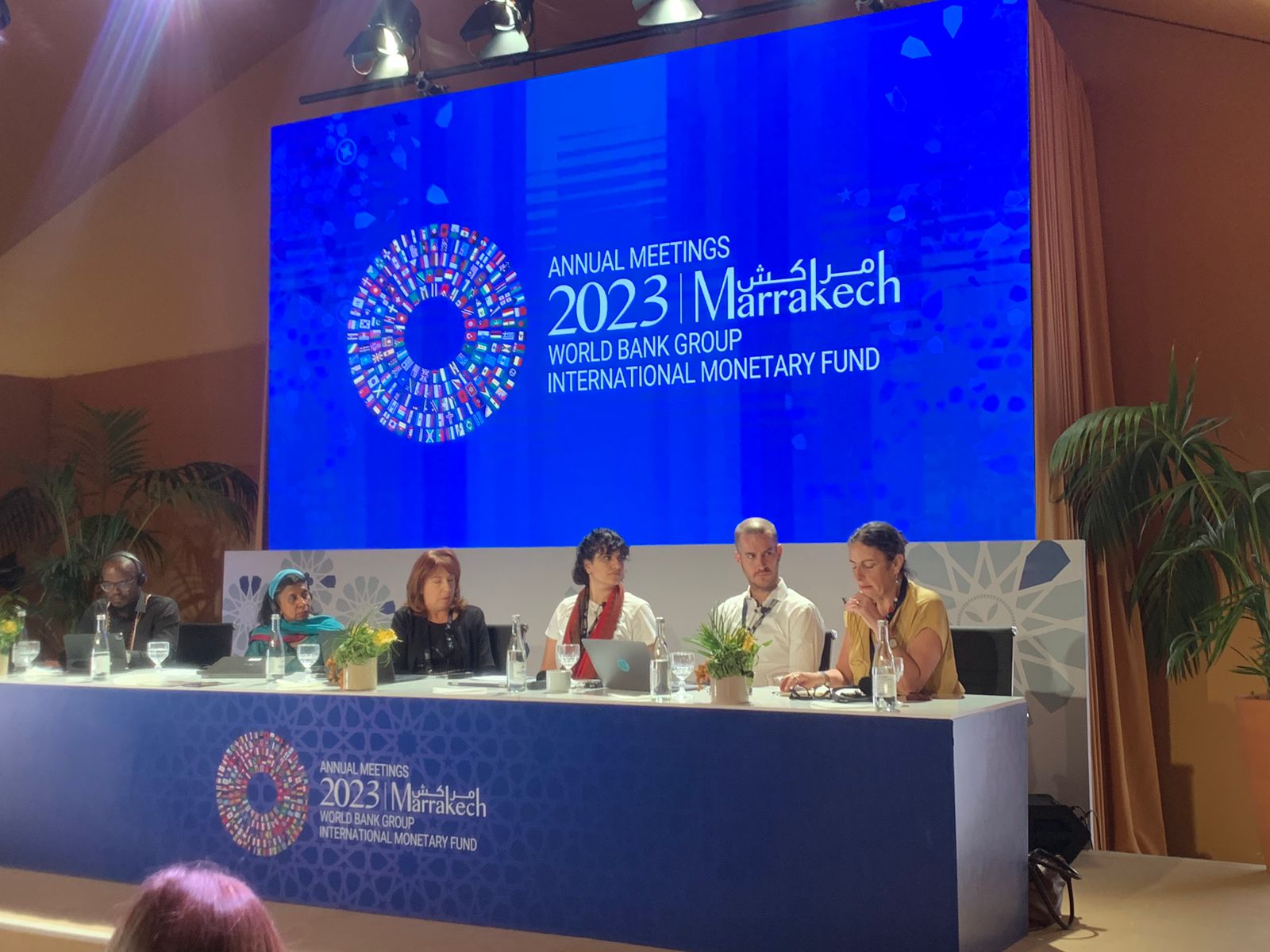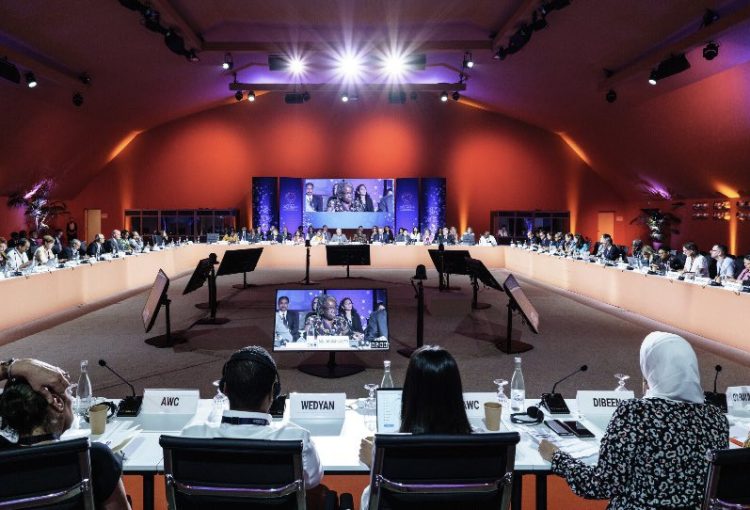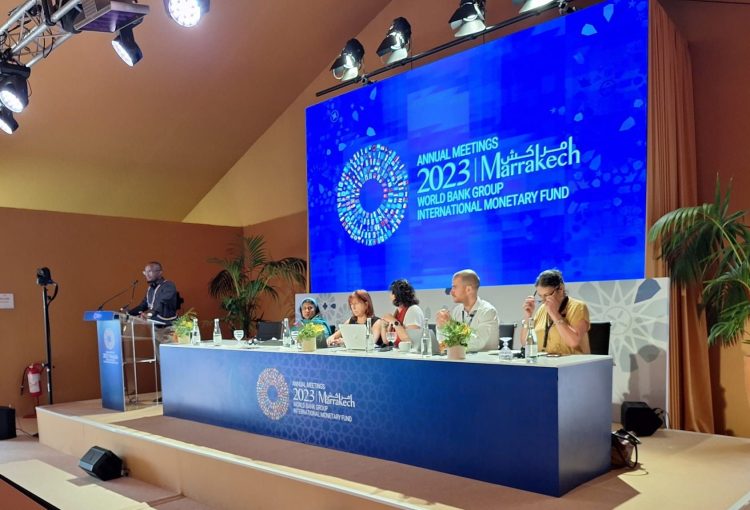Report: AWC’s Participation At The 2023 CSPF During The WBG/IMF Annual Meetings

Arab Watch Coalition (AWC) actively participated in the Civil Society Policy Forum (CSPF) during the 2023 Annual Meetings of the World Bank Group and International Monetary Fund (IMF), held in Marrakech from October 9 to October 15.
A diverse group of AWC members, representing a range of countries in the MENA Region, including Egypt, Jordan, Yemen, Tunisia, and Morocco, convened in Marrakech to take part in the CSPF.
At the event, notable participants included Ahmad Awad, President of AWC Board of Directors and the Founder and Director of the Phenix Center for Economic and Informatics Studies, Jordan; Sihem Bouazza, Member of AWC Board and President and founder of the Tunisian Association for Development Law (ATDD); Nadia Hmaity, Member of AWC Board and President of the LaSiesta Association for Environmental Protection and founder of Think Tank Clean Transition Morocco; Mohamed Benata, President of Espace de Solidarité et de Coopération de l’Oriental (ESCO), Morocco; Ahmed Chehbouni, President of the CDRT (Tensift Regional Center of Development), Morocco; Aicha Karafi, President of Tunisian Association of Local Governance (ATGL); Fanida Oubenaissa, Board member of Espace Point de Départ, Morocco; Abdelilah Tazi, President of the Talassemtane Association for Environment and Development (ATED), Morocco; Skander Sallemi, President of the Tunisian Association for Fiscal Governance (ATGF); Amro Nawayseh, Executive Director at Al-Hayat Center – Rased, Jordan; Ammar Mohammed Saleh, Secretary-General of Wedyan Association For Society Development,Yemen; Mohamed Settar, General Secretary of the Talassemtane Association for Environment and Development (ATED); Ayman Sabae, Founding Partner and CEO of the Egyptian Social Enterprise Shamseya; Hala Murad, CEO of Dibeen Association for Environmental Development, Jordan.
The CSPF represents a key event during the World Bank Group-IMF Annual Meetings which offers a platform where Civil Society Organizations can engage in dialogue and exchange ideas with World Bank Group and IMF staff, government delegations, peer organizations, and various stakeholders to openly address global development issues and foster collaboration to find effective solutions.
Arab Watch Coalition’s members participation was motivated by their commitment to utilize this civic space to advocate for several pressing issues including equitable taxation, social protection, climate justice, economic gender justice, and debt justice.
One notable panel during the Civil Society Policy Forum focused on tax justice, with a particular emphasis on taxing wealth as an alternative to austerity measures.
The panel was organized by Oxfam and co-sponsored by AWC, the Arab NGO Network for Development (ANND), International Trade Union Confederation, Ali Ben Ghedhahem Centre for Tax Justice (CAFJ), Social Justice Platform, The Moroccan Workers’ Union (UMT), The Malcolm H. Kerr Carnegie Middle East Center, and the Arab Reform Initiative.
During the panel, Amine Bouzaïene delivered a presentation on a paper published by AWC. The paper highlighted alternative fiscal policies, including strategies aimed at restructuring tax contributions across diverse sectors and implementing fair taxation practices , particularly targeting major corporations and high-income individuals.
The Annual Meetings were organized at a time when the World Bank was developing an evolution roadmap to increase its lending in order to address the growing poverty and climate crises. While the roadmap focuses on doing more, it lacks strategies for doing better. Civil society organizations, working with communities affected by unintended consequences of World Bank projects, understand that some projects, including those labeled as climate finance, can harm ecosystems and people. Without governance reforms, the Evolution Roadmap may perpetuate or exacerbate these issues. In response, civil society has proposed an Evolution to Accountability Roadmap to ensure that affected communities are central to the Bank’s mission.

AWC during the global consultations on the World Bank’s Evolution in Marrakech, October 10
AWC co-sponsored a panel addressing accountability lessons for the Bank’s Evolution Roadmap, exploring insights from past cases involving the WBG’s Independent Accountability Mechanisms to advance a vision of a fairer, more inclusive, and successful WBG evolution.
The panel was organized by Accountability Counsel and co-sponsored by the Center for International Environmental Law (CIEL), Bank Information Center (BIC), CEE Bankwatch Network, Green Advocates, Liberia, International Accountability Project (IAP), Jamaa Resource Initiatives, Oxfam, and Urgewald.
Furthermore, AWC organized a panel on the barriers to accountability that communities in the Middle East and North Africa face. This session was co-sponsored by the Center for International Environmental Law (CIEL), Accountability Counsel, Bank Information Center (BIC), and Urgewald, highlighting AWC’s commitment to tackling significant regional issues.

Panel discussion examining barriers to accountability for communities in the Middle East & North Africa in Marrakech October 12.
The panel discussed factors that hamper communities’ access to existing accountability mechanisms such as: shrinking civic space, untransparent lending instruments and existing institutional barriers, while offering recommendations to reduce those barriers and facilitate remedy.
The participation of Civil Society Organizations in the Civil Society Policy Forum serves as a significant platform for advocating change and addressing global development challenges. While these sessions may not yield immediate results, they offer valuable opportunities for CSOs to articulate their vision for change and underscore their dedication to ongoing efforts related to these issues. This effectively conveys to financial institutions the importance of the matters under discussion and the commitment to continued work on them.
These sessions also provide an opportunity for CSOs to build alliances and momentum with like-minded organizations and emphasize their unwavering commitment to ongoing work on these critical issues. The collective efforts of CSOs and the dialogues that take place during these events contribute to the broader conversation on global development and the pursuit of more equitable and just development policies.
